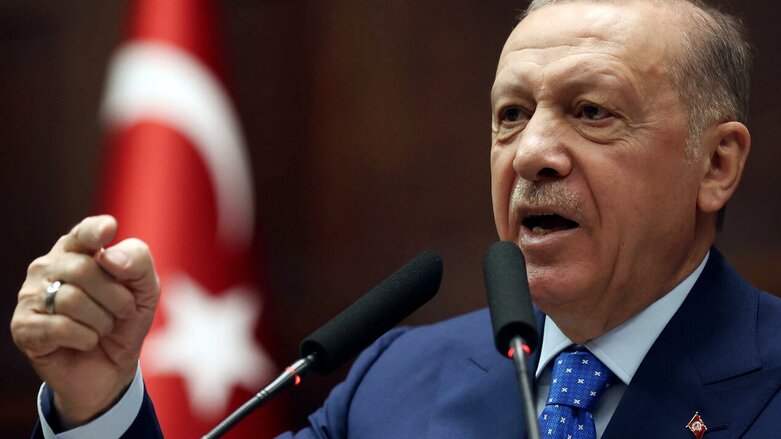Ex-US ambassador blasts Erdogan for opposing Finland and Sweden's entry into NATO

WASHINGTON DC (Kurdistan 24) – Eric Edelman, the former US ambassador to Turkey (2003-2005) as well as Finland (1998-2001), has issued two blistering critiques over the past two weeks of the opposition that Turkish President Recep Tayyip Erdogan has raised to the bid by Finland and Sweden to join the North Atlantic Treaty Organization (NATO), following Russia's Feb. 24 assault on Ukraine.
Edelman, who was Vice-President Dick Cheney's Principle Deputy National Security Advisor before assuming his ambassadorial post in Ankara, attributed Erdogan's position, in part, to his difficult domestic position ahead of the Turkish elections; his authoritarianism; and, related to that, his keen sense that Russia's aggression has created a unique opportunity, out of which he will extract as much as he is able.
But as Edelman suggested, over the long term, Erdogan is doing significant harm to Turkish national interests, as it "will reinforce every existing bad stereotype that regards Turks not as Europeans, but as Middle Easterners more interest in haggling in the souk than in policy outcomes."
Moreover, there is a particular danger to Kurds in northeast Syria.
Read More: US' deeply concerned' over Turkish threats to Rojava, as Erdogan seeks to exploit Ukraine crisis
The prestigious British news magazine, The Economist, warned last week of a possible deal between Ankara and Moscow. Erdogan would continue to block Finnish and Swedish membership in NATO in exchange for a green light from Russian President Vladimir Putin for a cross-border attack into Syria.
Turkey First Supported Finland—but Erdogan changed his mind!
When Finland first proposed joining NATO, Turkey was agreeable to the idea. But subsequently, Erdogan reversed his position. Erdogan's opposition "seems to represent a change of heart from earlier Turkish support for Finnish membership, conveyed to [Finnish President Sauli] Niinisto in an April 4 phone call and in bilateral diplomatic contacts," Edelman explained.
A Strongman's Impulse
As Edelman noted, that reflected, in part, Erdogan's recognition of an unusual opportunity created by the Russian attack on Ukraine, as he compared the Turkish leader to a former US governor, who actually served prison time for his abuse of power.
Chicago has long been notorious for Mafia-linked corruption. One such figure, Rod Blagojevich, became governor of Illinois, a position he held when a senator from Illinois, Barack Obama, became US president.
In that case, the governor has the authority to appoint the next senator. Blagojevich, after learning that, "famously said," as Edelman related, "I've got this thing and its f—ing golden. I'm not just giving it up for f—ng nothing."
Thus, Blagojevich solicited bribes to make that appointment. A federal prosecution uncovered his actions, and he was tried and sentenced to 14 years in prison—although US President Donald Trump commuted his sentence and had him freed after eight years.
"Erdogan's 'strongman' need for constant attention and his failure, so far, to secure a bilateral meeting with Biden or to establish the kind of access he enjoyed to the US president under both Obama and Trump undoubtedly explain" his position on the two Nordic countries bid for NATO membership, Edelman said.
That carries not only risks for them but for Turkey as well, as "it has left diplomats at NATO headquarters in Brussels furious with the Turks," despite public statements to the contrary, the former ambassador warned.
Turkish Economic Failure and Upcoming Elections
Next year, in June 2023, Turkey will hold a general election. At that point, Erdogan will have been the leader of his country for the past two decades—its longest-serving leader since the defeat and collapse of the Ottoman Empire after World War I.
The Economist, reporting from Istanbul, noted that Turkey's "official inflation rate has now topped a staggering 73%," and "the true figure may be in triple digits," as "opinion polls suggest that most Turks have no faith in the country's statistics agency."
"With the economy beyond repair," it continued, Erdogan's "election strategy is starting to come into focus."
The Turkish president "has decided instead to search for monsters to destroy abroad and at home." As the British magazine summarized it, Erdogan's electoral effort is "dressed up as a war on terror."
As it noted, "Officially," Erdogan "is upset with Sweden and Finland for refusing to extradite a handful of Kurdish militants, a septuagenarian human-rights activist, and followers of the Gulen movement," but "his true motives are inscrutable," and he "is already using the crisis to score points at home by whipping up anger against Europe."
Warning to Rojava
The Economist also carried a warning for Kurds in northeast Syria. Erdogan has been "banging war drums" there, it said. "A successful invasion would link up areas Turkey captured in three previous offensives, giving its troops, flanked by thousands of Syrian Arab mercenaries, control over a 650 km long strip of northern Syria."
Erdogan's decision on whether to attack or not may well "hinge on approval from Russia," it continued, but "Putin may be too bogged down in Ukraine to oppose the incursion."
Putin might "be tempted to offer [Erdogan] a green light in Syria," the magazine continued, "as a token of appreciation for his pledge to block Sweden's and Finland's accession to NATO."